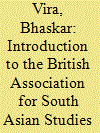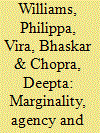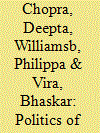| Srl | Item |
| 1 |
ID:
084240


|
|
|
|
|
| Publication |
2008.
|
| Summary/Abstract |
This paper introduces the British Association for South Asian Studies special issue of Contemporary South Asia. Contributions to this volume have been made based on papers presented by participants at the 21st British Association for South Asian Studies Annual Conference held in Cambridge in March 2007. The papers in the collection reflect on different aspects of identity in the contemporary South Asian context, focusing on caste, religion, gender and tribe, and explore the relevance of these signifiers in the lived everyday experiences of these different communities, as well as their broader implications for the contemporary politics of the region.
|
|
|
|
|
|
|
|
|
|
|
|
|
|
|
|
| 2 |
ID:
084239


|
|
|
| 3 |
ID:
103170


|
|
|
|
|
| Publication |
2011.
|
| Summary/Abstract |
The idea of the state has shown remarkable resilience over the last couple of decades, despite assaults on it from neoliberal doctrines and the forces of globalization. During this period, the abiding presence and role of the state has been particularly evident in the contemporary political life of the Asia Pacific region. This article pays special attention to the contemporary Indian state in the context of development. It reflects upon the ways in which the state is experienced, by focusing on questions of marginality, agency and power as they intersect the politics of development. By reading the empirical insights documented within this special issue against a rich trajectory of scholarship on the Indian state, the article argues that there has been a recent qualitative change in the way in which the contemporary Congress-led UPA government has presented itself to the common person. The implementation of pro-poor and more inclusive policies has altered the discursive landscape within which state-society interactions have taken place over the last five years. Importantly, these policies have functioned to reconfigure not only the material interactions between the state and India's marginalized, but also the imagined spaces within which marginal groups renegotiate their relationships with the state.
|
|
|
|
|
|
|
|
|
|
|
|
|
|
|
|
| 4 |
ID:
107218


|
|
|
|
|
| Publication |
2011.
|
| Summary/Abstract |
This introduction discusses the articles in this Special Issue, which are all focused on exploring the everyday interactions between marginalised individuals and groups and the state in contemporary India. In particular the articles highlight the experiences of a diverse set of marginalised groups - Muslim artisans and weavers, Dalits, Tibetan exiles and post-conflict victims in Gujarat - in order to work towards an understanding of the politics of citizenship from the margins. Across these articles two interlocking themes emerge. Firstly, how different marginalised groups have experienced, critiqued and engaged with different aspects of the `welfare state'. Secondly, the way in which agencies were articulated from the margins through these processes of engagement, shaping and recasting interactions between the state and society in India. We argue that the deployment of different strategies of engagement with the state by India's marginalised can be viewed as a politics of citizenship, through which marginalised people (re)make themselves as citizens. This essay is thus a call for future research on citizenship as a lived experience which is operationalised in local practices and quotidian interactions between the state and society.
|
|
|
|
|
|
|
|
|
|
|
|
|
|
|
|